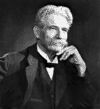- Schweitzer, Albert
- ► (1875-1965) Teólogo protestante, médico y organista francés. En la República de Gabón fundó y dirigió un hospital para negros. Fue premio Nobel de la Paz en 1952, por su humanitaria labor.
* * *
(14 ene. 1875, Kaysersberg, Alta Alsacia, Alemania–4 sep. 1965, Lambaréné, Gabón).Teólogo, filósofo, organista y misionero médico alemán de origen alsaciano. En su juventud se licenció en filosofía (1899) y llegó a ser un notable organista. En su biografía de Johann Sebastian Bach (2 vol., 1905) lo consideraba un místico religioso. También escribió sobre la construcción de órganos y produjo una edición con las obras de Bach para órgano. Entre sus libros sobre religión figuran varios acerca de San Pablo; su Historia de las investigaciones sobre la vida de Jesús (1910) tuvo amplia influencia. En 1905 anunció que se haría médico misionero y se dedicó a obras filantrópicas. En 1913 se trasladó con su esposa a Lambaréné, en el África Ecuatorial Francesa (actual Gabón) y con los habitantes locales construyeron un hospital a orillas del río Ogooué, al que posteriormente incorporaron una colonia de leprosos. En 1952 recibió el Premio Nobel de la Paz por sus esfuerzos en favor de la "Hermandad de las naciones. Dos años antes de su muerte, su hospital y la colonia de leprosos atendían a 500 pacientes. En sus libros filosóficos analiza su famoso principio de la "veneración por la vida. Albert Schweitzer, fotografía por Yousuf Karsh.© Karsh from Rapho/Photo Researchers
Albert Schweitzer, fotografía por Yousuf Karsh.© Karsh from Rapho/Photo Researchers
Enciclopedia Universal. 2012.
